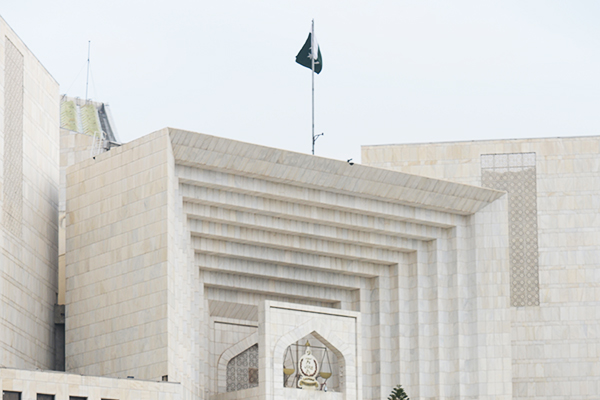
File photo. Farooq Naeem—AFP
Joint resolution of various bar associations stresses on seniority for all appointments to apex court
Pakistan’s legal community on Monday threatened to boycott all court proceedings—from lower courts to the Supreme Court—on Jan. 6 (Thursday) if Chief Justice Gulzar Ahmed does not postpone or recall a meeting of the Judicial Commission of Pakistan to deliberate on the elevation of Lahore High Court Justice Ayesha Malik to the apex court.
A joint resolution passed by representatives of the Pakistan Bar Council, provincial bar councils, all high court bar associations and the Supreme Court Bar Association stressed that it would have no choice but to register its protest if the principle of seniority is violated to elevate judges to the Supreme Court.
“The bar consistently stands with the seniority principle for the purposes of elevations/appointments of judges in the honorable Supreme Court, as also laid down in the Al-Jehad Trust Case,” read a statement issued after the representative meeting. It said that the meeting’s participants had stressed that any violation to seniority would “create further divisions not only between bar and the bench but will also create further dissention and frustration within the judiciary.”
Emphasizing that the bars were committed to the independence of the judiciary, rule of law, and establishment of real democratic institutions in Pakistan, it said that “serious note” had been taken of the nomination of Justice Ayesha Malik for appointment to the Supreme Court. Claiming that this appointment would supersede three judges of the Lahore High Court, it questioned why their seniority was not being considered, especially if their “integrity and competence” was not in question.
It said that the Judicial Commission of Pakistan should establish a detailed criteria for elevation and appointment of judges in the superior courts in consultations with the bar and the parliamentary committee
The resolution recalled that representatives of the bar councils in the Judicial Commission of Pakistan had been demanding amendments in the Judicial Commission Rules, 1980 for over three years. “This meeting is of the considered view that no further appointment in the honorable Supreme Court be made till the detailed criteria viz-a-viz taking into consideration the seniority principle and so also the amendments in the Judicial Commission of Pakistan Rules, 1980 for such appointment are made,” it added.
It also called on the chief justice of Pakistan to not back down from his principled stance of not initiating the process of any elevation/appointment in the superior judiciary near the end of his tenure. The incumbent CJP has less than a month remaining in office, as he is scheduled for superannuation on Feb. 1.
The resolution said the meeting’s participants had resolved to approach Parliament and all major political parties to seek amendments in Article 175A and Article 209 of the Constitution. Article 175-A deals with the procedure to appoint judges in the superior courts, while Article 209 provides a forum for the removal of a superior court judge.
The Jan. 6 session of the Judicial Commission of Pakistan was summoned after the CJP once again proposed the name of Justice Ayesha Malik for elevation to the Supreme Court. The matter had come before the Commission on Sept. 9 previously and had been deferred due to a lack of consensus on elevating Malik—fourth in the seniority list of the LHC—as the first woman judge of the Supreme Court of Pakistan.
